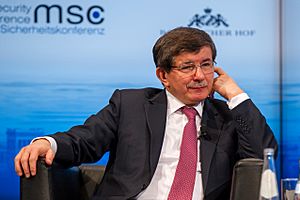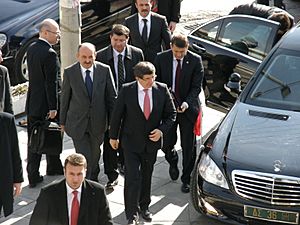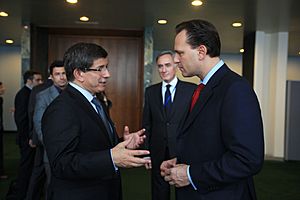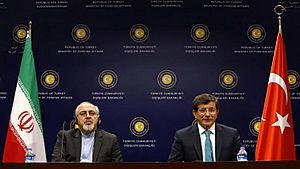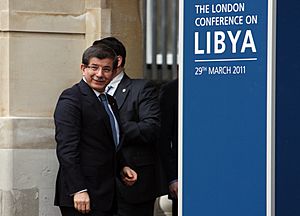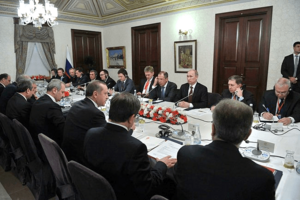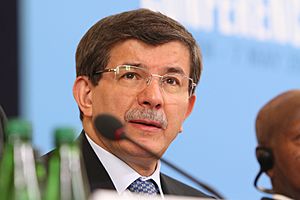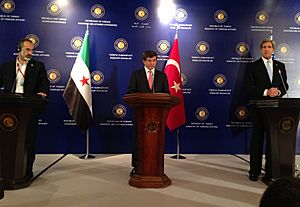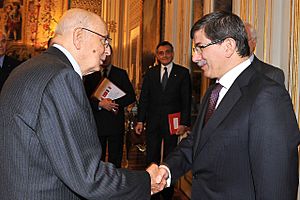Ahmet Davutoğlu facts for kids
Quick facts for kids
Ahmet Davutoğlu
|
|
|---|---|
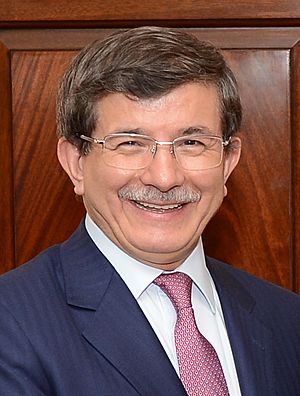
Davutoğlu in 2013
|
|
| Leader of the Future Party | |
| Assumed office 19 December 2019 |
|
| Preceded by | Party established |
| 26th Prime Minister of Turkey | |
| In office 28 August 2014 – 22 May 2016 |
|
| President | Recep Tayyip Erdoğan |
| Deputy |
Cabinet I (2014–2015)
Cabinet II (2015)
Cabinet III (2015–2016)
Yalçın Akdoğan
Numan Kurtulmuş Tuğrul Türkeş Lütfi Elvan Mehmet Şimşek |
| Preceded by | Recep Tayyip Erdoğan |
| Succeeded by | Binali Yıldırım |
| Leader of the Justice and Development Party | |
| In office 27 August 2014 – 22 May 2016 |
|
| Preceded by | Recep Tayyip Erdoğan |
| Succeeded by | Binali Yıldırım |
| Minister of Foreign Affairs | |
| In office 1 May 2009 – 29 August 2014 |
|
| Prime Minister | Recep Tayyip Erdoğan |
| Preceded by | Ali Babacan |
| Succeeded by | Mevlüt Çavuşoğlu |
| Member of the Grand National Assembly | |
| In office 28 June 2011 – 7 July 2018 |
|
| Constituency | Konya (2011, June 2015, Nov 2015) |
| Personal details | |
| Born | 26 February 1959 Taşkent, Konya, Turkey |
| Political party | Future Party (2019–present) |
| Other political affiliations |
Justice and Development Party (2002–2019) |
| Spouse |
Sare Kundak
(m. 1984) |
| Children | 5 |
| Alma mater | Istanbul High School Boğaziçi University |
| Signature | |
Ahmet Davutoğlu (born 26 February 1959) is a Turkish academic and politician. He was the Prime Minister of Turkey and leader of the Justice and Development Party (AKP) from 2014 to 2016. Before that, he was the Minister of Foreign Affairs from 2009 to 2014. He also served as a chief advisor to Prime Minister Recep Tayyip Erdoğan.
Davutoğlu became Prime Minister after Recep Tayyip Erdoğan was elected President of Turkey in 2014. He was chosen as the leader of the AKP and then formed the government. His time as Prime Minister saw increased conflict between the government and the Kurdistan Workers' Party (PKK). He resigned as Prime Minister in May 2016 due to disagreements with President Erdoğan.
In 2019, Davutoğlu left the AKP and started his own political group, the Future Party. This party is now part of the Nation Alliance, which is against the AKP and President Erdoğan.
Contents
Early Life and Education
Ahmet Davutoğlu was born in Taşkent, a town in Konya, Turkey. He went to Istanbul High School and then studied at Boğaziçi University in Istanbul. He earned a master's degree in public administration and a PhD in political science and international relations.
From 1993 to 1996, Davutoğlu taught political science at the International Islamic University Malaysia. Later, he worked at Marmara University and became a full professor in 1999. He also led the Department of International Relations at Beykent University in Istanbul.
In 2003, he was given the title of ambassador. He is married to Sare Davutoğlu, a doctor, and they have five children. He speaks Turkish, German, English, Arabic, and Malay.
His book Strategic Depth is very important for understanding Turkey's foreign policy. It even became a bestseller in Greece.
Advisor to the Prime Minister
Davutoğlu became the chief foreign policy advisor to Recep Tayyip Erdoğan when Erdoğan became Prime Minister in 2003. He helped shape Turkey's new foreign policy, which aimed for Turkey to play a bigger role in the Middle East. He helped guide Turkey's response during the 2003 war in Iraq. He was against US troops entering northern Iraq because of concerns about Kurdish groups there.
Foreign Policy Ideas
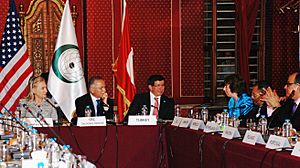
Davutoğlu's foreign policy ideas are often linked to Neo-Ottomanism. This idea suggests that Turkey should build stronger ties with countries that were once part of the Ottoman Empire. He believes Turkey should be a very influential country in world politics.
Some experts also say Davutoğlu has Pan-Islamist foreign policy ideals. This means he sees Islam as a way to unite countries in the Middle East. However, Davutoğlu has also supported Turkey's goal of joining the European Union, showing a pro-Western approach.
Neo-Ottomanism Explained
Davutoğlu wants Turkey to be more than just a strong country in its region. He wants Ankara to have a much bigger role in global politics. He is often connected to the idea of Turkish neo-Ottomanism. This idea supports working closely with countries that used to be part of the old Ottoman Empire.
Davutoğlu himself has said that Turkey is not trying to create a new empire. He believes Turkey is working to help bring lasting peace to the region. In 2013, he spoke about creating a closer union among former Ottoman lands. But he made it clear that Turkey would not claim any land based on old borders.
Pan-Islamism Explained
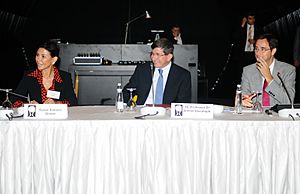
Some experts believe Davutoğlu's ideas are more about Pan-Islamism than neo-Ottomanism. This idea suggests that Turkey should not focus on joining Western nations. Instead, it should work to unite countries in the Middle East. This would increase their power and unity.
Since the Middle East has many different cultures, pan-Islamists believe that only Islam can create a strong and lasting union. This is because many people in the region share the Islamic faith.
Relations with the Muslim Brotherhood
Davutoğlu's foreign policy has also been linked to the Muslim Brotherhood. After the leader of Egypt, Mohamed Morsi, who was supported by the Muslim Brotherhood, was removed from power in 2013, Turkey became a key supporter of the Brotherhood in the region.
Turkey has hosted meetings for the Muslim Brotherhood. This caused some problems with Egypt's government. Some countries criticized Turkey for getting involved in Egypt's internal affairs.
Minister of Foreign Affairs (2009–14)
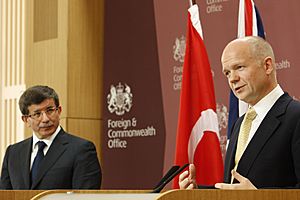
Davutoğlu became the Minister of Foreign Affairs in 2009. He was not a member of parliament at that time. He later became a Member of Parliament for Konya in the 2011 election. He continued as foreign minister in Prime Minister Erdoğan's government.
He was named one of the "Top 100 Global Thinkers of 2010" by Foreign Policy magazine. This was for his ideas about Turkey's role in the world. He spoke about his "Zero Problems Policy," which aimed to have good relations with all countries.
Later, some people criticized his time as foreign minister. They pointed to problems with Turkey's policy on the Syrian Civil War. They also mentioned his strong stance against the Egyptian President Abdel Fattah el-Sisi. Many were concerned about Turkey's actions regarding the Islamic State of Iraq and the Levant (ISIL).
Armenia
In April 2014, Davutoğlu and President Erdoğan released a statement about the 1915 Armenian deportations. They agreed these events were inhumane and should be studied by historians. However, they did not recognize them as the Armenian genocide.
Egypt
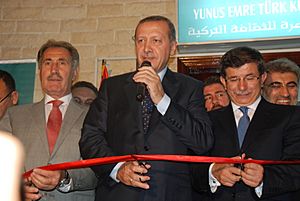
Davutoğlu oversaw better relations with Egypt after Mohamed Morsi became president in 2012. But relations quickly worsened after Morsi was removed from power in 2013. Davutoğlu and Erdoğan strongly criticized Morsi's removal.
Turkey's strong stance on Egypt led to criticism from other countries. Some argued it hurt Turkey's influence in the Middle East.
European Union
Davutoğlu has supported Turkey joining the European Union. He said that Turkey has aimed for EU membership for 50 years. He believes Turkey's membership would help it build stronger ties in the Balkan and Mediterranean regions. It could also help fight poverty in North Africa.
However, talks stalled due to issues like Turkey's policy on Cyprus. Also, the Gezi Park protests and the government's response caused further delays.
Greece and Cyprus
In 2012, Davutoğlu said that the Greek government was not respecting the rights of Turkish minorities. He also discussed a possible two-state solution for the Cyprus dispute in 2013.
In May 2014, Davutoğlu stated that Turkey would not pay compensation to the Republic of Cyprus for damages from the 1974 Cyprus invasion. This was despite a court ruling. He argued that Turkey did not recognize the court's decision.
Iran
As foreign minister, Davutoğlu was concerned about Iran's nuclear program. But he also wanted to improve relations with Iran. Iran is a major oil supplier for Turkey. He stated that Turkey would not place an embargo on Iranian oil.
After a temporary deal on Iran's nuclear program was reached, Davutoğlu congratulated Iran. He said that lifting sanctions would help both Turkey and Iran.
Iraq and ISIL
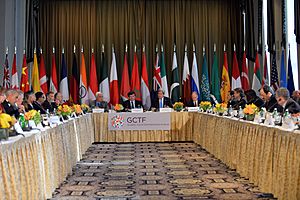
Davutoğlu said Turkey's policy against the Islamic State (ISIL) was to prevent violence. He blamed the then-Prime Minister of Iraq for the rising violence.
His policy on ISIL faced strong criticism. Some accused Turkey of not doing enough or even supporting the group. Davutoğlu denied these claims. He stated that Turkey was a major helper of humanitarian aid in Iraq.
Israel and Gaza
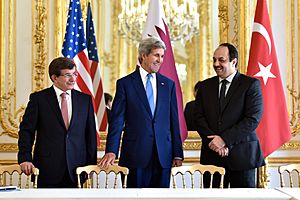
After an incident involving the Mavi Marmara ship in 2010, Davutoğlu set three conditions for improving relations with Israel. These were an apology, compensation, and lifting the blockade of the Gaza Strip. An apology was secured in 2013, and compensation deals were made in 2014.
During the 2014 Israel-Gaza conflict, Davutoğlu actively worked to provide humanitarian help to Gaza. Relations between Turkey and Israel worsened during this time.
Libyan Civil War
Davutoğlu took a humanitarian approach during the Civil War in Libya. He focused on ending the suffering of civilians. He warned against full military action, saying it should not become like the wars in Iraq or Afghanistan.
In 2011, Turkey cut ties with the old Libyan government. It recognized the National Transitional Council as the new government. Turkey also promised more financial aid to the rebels.
Russia and Crimea
Turkey has generally maintained good relations with Russia. Davutoğlu helped keep ties strong even when the two countries disagreed on issues like the annexation of Crimea and the Syrian Civil War. Economic ties, especially natural gas imports, are important.
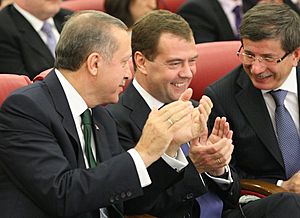
Davutoğlu supported a peaceful solution to the Russo-Ukrainian war. He also raised concerns about the treatment of Crimean Tatars by Russian forces. He stated that Turkey would not recognize the results of the vote in Crimea.
Somalia
Davutoğlu played a key role in Turkey's strong ties with the Federal Government of Somalia. Turkey was one of the first countries to reopen its embassy in Mogadishu after the civil war.
Turkey and Somalia have worked together on military, social, economic, and infrastructure projects. Davutoğlu also helped with peace talks between the Somali federal government and the Somaliland region.
Syrian Civil War
The Turkish government strongly opposed Bashar al-Assad in the Syrian Civil War. Davutoğlu supported strengthening the rebels. However, this became more complex as militant groups grew in Syria.
In 2012, Davutoğlu called for "safe zones" in northern Syria for refugees. He warned that global inaction could lead to a failure like in the Bosnian War. He stated that Turkey had spent a lot of money on refugee camps. He also said that the world had "failed Syria."
In March 2014, a Syrian fighter jet was shot down by the Turkish Armed Forces. Davutoğlu said the jet had entered Turkish airspace.
Domestic Views
Even as foreign minister, Davutoğlu was active in shaping Turkey's domestic policy. He strongly supported Prime Minister Erdoğan during the 2013–14 protests in Turkey and the 2013 government issues. This support was a key reason he was later chosen to succeed Erdoğan.
Reyhanlı Bombings
After an attack in Reyhanlı that killed 52 people, Davutoğlu stated that the attackers were known and caught. He warned against blaming the Syrian opposition.
2013–14 Anti-Government Protests
Davutoğlu was a strong critic of the anti-government protests that began in May 2013. He claimed that the protests, which started peacefully, were taken over by militant groups. He defended the police's actions, saying the government was trying to maintain law and order.
2013 Government Issues
Davutoğlu denied that any major issues had happened during the AKP government. He said his party would fight against anyone trying to steal from the Turkish people. He also claimed that the AKP was the strongest force against such problems.
He stated that the 2013 issues were just a "transition from one era to another." He believed his party would continue with its planned reforms. He remained loyal to Prime Minister Erdoğan, saying Erdoğan was the real target of the issues.
2014 Soma Mining Disaster
After an explosion in the Soma coal mine in May 2014 killed 301 miners, Davutoğlu declined international offers of help. He said Turkish rescue workers could handle the disaster.
He offered his condolences and promised to find out what caused the accident. He defended Prime Minister Erdoğan's comments about mining disasters being common challenges. He also said he would respect protests related to the disaster.
Premiership (2014–16)
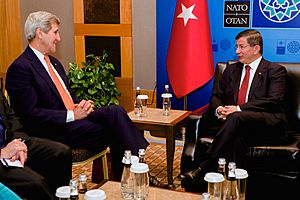
Ahmet Davutoğlu became the 26th Prime Minister of Turkey on 29 August 2014. This happened after his predecessor, Recep Tayyip Erdoğan, was elected President. Davutoğlu led the 62nd government of Turkey.
Some people compared Davutoğlu's rise to that of Yıldırım Akbulut in 1989. Akbulut became prime minister after President Turgut Özal was elected. Many believed Akbulut was a quiet leader while Özal made the main decisions. Similarly, some thought Davutoğlu would be a submissive prime minister while Erdoğan continued to guide political matters.
Becoming AKP Leader
When Recep Tayyip Erdoğan became president, the leadership of the AKP became open. Davutoğlu was chosen as the candidate for party leader. He was elected without opposition in August 2014. He then formed his government.
Davutoğlu's strong support for Erdoğan during past protests and government issues was a key reason for his selection. Critics thought his loyalty would allow Erdoğan to keep control of the government from his presidential role. However, some believed Davutoğlu would be an independent leader, given his strong actions as foreign minister.
Economic Policy
Davutoğlu became prime minister during a time of economic slowdown. His government lowered economic growth predictions. They aimed to boost the economy through global connections. Plans included improving technology, energy, health, and tourism.
The government also aimed to reduce Turkey's reliance on foreign energy. They promised not to use popular but risky economic policies before the June 2015 election.
Government Issues and Legal Reforms
When he became prime minister, Davutoğlu promised to fight against issues within the government. However, opposition parties questioned his true intentions. They claimed he was appointed to stop investigations from the 2013 issues.
Davutoğlu's government also carried out many arrests of police officers. This was part of an effort to deal with a group called the Gülen Movement. Many of these officers were released later due to lack of evidence. This raised questions about the government's reasons.
Constitutional Reform
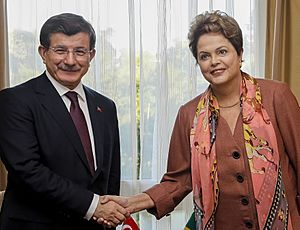
Davutoğlu stated that a main goal was to write a new constitution. He wanted a more open and diverse constitution that would meet modern Turkey's needs. The opposition, however, worried that these changes would weaken the principles of Mustafa Kemal Atatürk and the independent court system.
Workers' Rights
Turkey has a high number of worker deaths in Europe. After the Soma mine disaster in 2013, worker safety became a big concern. Davutoğlu's government promised to improve safety. They passed a law to help families of those killed in Soma. This law also set limits on working hours and lowered the retirement age for miners.
Another mine accident happened in October 2014. This led to more public anger about worker safety. Davutoğlu promised to review safety laws.
Resignation as Prime Minister
On 5 May 2016, Davutoğlu announced he would resign as leader of the AKP. He said an extraordinary party meeting would be held on 22 May 2016 to choose a new leader. This meant he was also resigning as Prime Minister of Turkey. His resignation came after growing disagreements with President Recep Tayyip Erdoğan. Erdoğan wanted a presidential system of government, which would reduce the Prime Minister's powers.
Relationship with Erdoğan
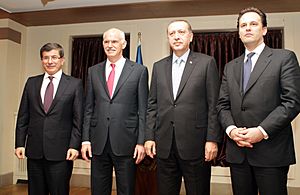
Many people noticed a growing power struggle between Davutoğlu and President Erdoğan. There were disagreements about the AKP's list of candidates for elections. Erdoğan also chaired a cabinet meeting, which was unusual for a president. This led to rumors of a rift between them. Davutoğlu denied these rumors, saying there was no disagreement.
April–May 2016 Disagreements
By late April and early May 2016, the disagreements between Davutoğlu and Erdoğan became very clear. A list of 27 disagreements, called the Pelican files, was shared by Erdoğan's supporters. These included Davutoğlu's concerns about Erdoğan's desire for a presidential system. They also disagreed on how to handle the conflict with the Kurdistan Workers Party (PKK).
The AKP's Central Executive Decision Committee voted to take away the party leader's power to appoint local party officials. Although Davutoğlu said he supported this, it was believed Erdoğan had told the committee to make this change. These events led to Davutoğlu's resignation.
Meeting with Erdoğan and Resignation Speech
On 4 May 2016, Davutoğlu met with Erdoğan. Shortly after, it was announced that the AKP would hold an extraordinary meeting in May. Davutoğlu would not run as a candidate. This confirmed that they had not reached an agreement.
A day later, Davutoğlu announced his resignation. He said he would not try to divide the party and would continue to support Erdoğan. He also stated that his resignation was not his choice but a "necessity."
Reactions to Resignation
The main opposition party, the Republican People's Party (CHP), called the resignation a "coup." They said Erdoğan had removed a prime minister who was elected by the people. The White House stated they did not expect changes in relations with Turkey. They called Davutoğlu a "good ally."
The Turkish lira currency fell sharply after the announcement. Many international commentators saw Davutoğlu's resignation as a sign that Erdoğan wanted more control over the government. They believed his successor would be more willing to follow Erdoğan's plans.
Future Party (GP)
In December 2019, Davutoğlu started his own political group, the Future Party (GP). This party is a right-leaning conservative party. It supports returning to a parliamentary system and creating a new constitution for Turkey.
Electoral Record
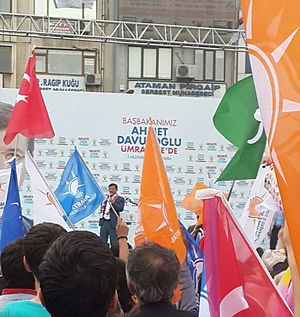
As Prime Minister, Davutoğlu led the AKP in two general elections.
General Elections
Davutoğlu became Foreign Minister in 2009. He was elected as a Member of Parliament for Konya in the 2011 general election.
As party leader, Davutoğlu led the AKP in the June 2015 general election. The party won 40.87% of the vote, which was less than before. They lost their majority in parliament for the first time since 2002. However, in the November 2015 snap election, the AKP regained its majority with 49.50% of the vote.
| General election record of Ahmet Davutoğlu 0–10% 10–20% 20–30% 30–40% 40–50% 50–60% 60–70% 70–80% |
||||||||||
|---|---|---|---|---|---|---|---|---|---|---|
| Party | Election | Vote | Seats | Result | Outcome | Map | ||||
| AKP | 7 June 2015 | 
18,867,411 |
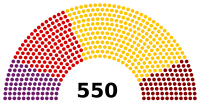
258 / 550 ( |
40.87%
|
#1st Hung parliament |
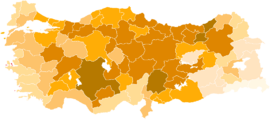 |
||||
| AKP | 1 November 2015 | 
23,681,926 |
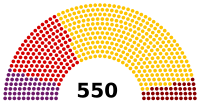
317 / 550 ( |
49.50%
|
#1st AKP majority |
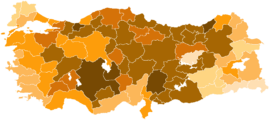 |
||||
| GP | 2023 | 
10 / 600 (new) |
AKP majority | |||||||
Local Elections
| Party | Election | Votes | Share of votes | Map | ||
|---|---|---|---|---|---|---|
| GP | 2024 | 34,2120 | .07% | |||
Books by Ahmet Davutoğlu
- Alternative Paradigms: The Impact of Islamic and Western Weltanschauungs on Political Theory. University Press of America, 1993
- Civilizational Transformation and the Muslim World. Quill, 1994
- Stratejik derinlik: Türkiye'nin uluslararası konumu. Küre Yayınları, 2001
- Osmanlı Medeniyeti: Siyaset İktisat Sanat. Klasik, 2005
- Küresel Bunalım. Küre, 2002.
See also
 In Spanish: Ahmet Davutoğlu para niños
In Spanish: Ahmet Davutoğlu para niños
- Foreign policy of the Recep Tayyip Erdoğan government
- List of Turkish diplomats
- Intermediate Region
- Hellenoturkism
- Ali Babacan


